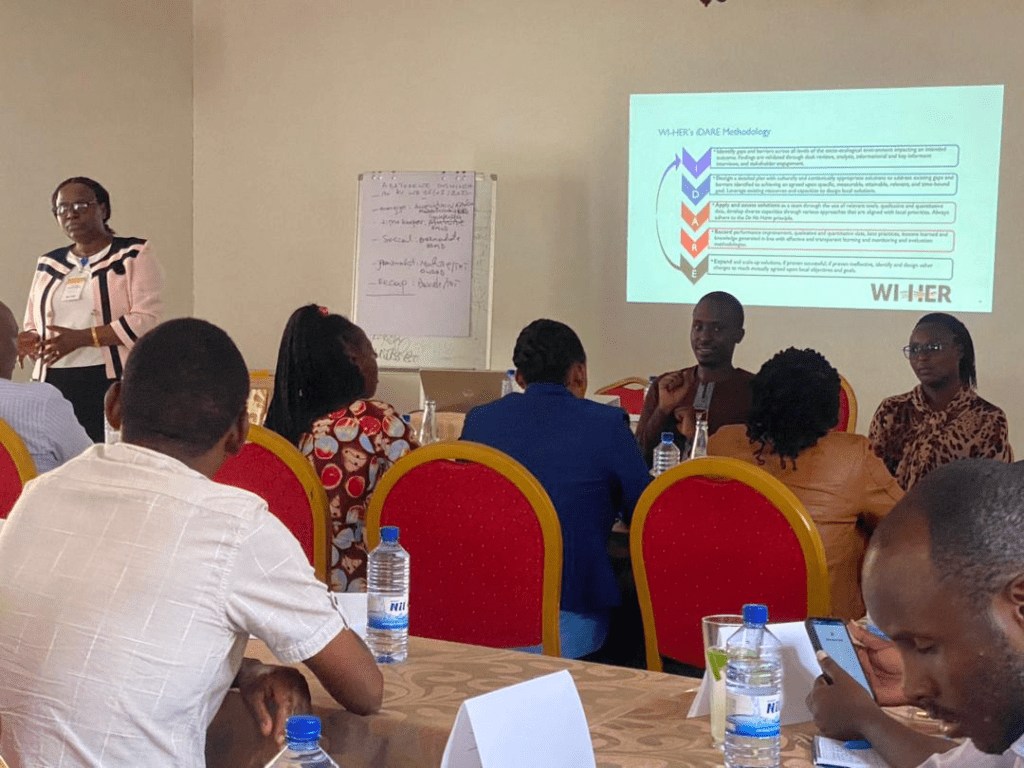Strengthening Capacity of Organizations to Provide Gender Equity and Social Inclusion Services For People With Disabilities in Rwanda: A Recap on a Workshop with UPHLS
By Floride Yamuragiye, WI-HER Technical Advisor, Africa

Understanding gaps in knowledge is critical to program design and implementation. In early 2023, WI-HER conducted a workshop with the Umbrella of Organization of Persons with Disabilities in the Fight against HIV/AIDS and for Health Promotion (UPHLS) to strengthen their capacity in gender equality mainstreaming and social inclusion, and gender-based violence (GBV) prevention and response by introducing them to WI-HER’s iDARE methodology. The training took place in Rwanda for UPHLS’s 13 organizations and a total of 59 participants, including board members, executive directors, and UPHLS staff. Among the participants, three women and one man had a hearing impairment, four were with a vision impairment, and seven had severe physical disabilities.
Goals and Objectives of the Workshop
The overall goal of the workshop was to create awareness of gender mainstreaming and GBV prevention among UPHLS organization members to address inequalities in delivering social services to people with disabilities in Rwanda. The workshop focused on the following specific objectives:
- Introduce key gender equity and social inclusion (GESI) concepts affecting program/project outcomes, including gender-based violence;
- Introduce WI-HER’s iDARE methodology and train participants on its application in the project implementation;
- Identify opportunities to close GESI-related gaps affecting program outcomes and sustainability among UPHLS organization members; and,
- Draft gender action plans for each partner organization to support capacity-building efforts following the training.
During the three days of training, from January 17-19th, 2023, participants learned about key gender concepts, including gender, sex, gender equity and equality, gender mainstreaming and integration, gender-responsive budgeting, gender-based violence, the gender equality continuum tool, and WI-HER’s iDARE methodology.
The UPHLS members expressed appreciation for the training and were very interested in the iDARE methodology due to the way it will help them develop locally led solutions to address gaps in their organizations.
Aimable Rukundo, Executive Director of the Association Générale des Handicaps au Rwanda (AGHR), shared: “I am so thankful for this training on gender equality and social inclusion organized by UPHLS in partnership with WI-HER. We have learned a lot from that training, especially I have understood deeply gender equality and equity to cater to the specific needs of each and everyone, and that helps in addressing inequalities. And the use of the iDARE methodology makes it possible to address identified challenges and gaps that affect the program through setting goals and applying identified solutions. I found the methodology very helpful in our different organizations in the identification of gaps and addressing them. Many of us were not aware of the importance of having a gender policy. For us producing data showing male and female was enough, but we have understood the importance of collecting disaggregated data. We wish for the continuity of partnership between WI-HER and UPHLS to help us cascade the knowledge acquired to other staff and the implementation of iDARE methodology to help us have locally led solutions and scale up them to achieve more.”
Following the workshop, UPHLS member organizations drafted action plans to address inequalities within their respective organizations, which was an effective strategy to build capacity in GESI among respective staff and program participants. Some examples of action plans from the organizations include:
- Cascade training on GBV prevention and response within their organization with staff and beneficiaries with disabilities; and,
- Improve school attendance of children with disability (both boys and girls) among their beneficiaries
Lesson Learned from the UPHLS Workshop
- It was very important to build the capacity of UPHLS organization members, starting with decision makers, because when they understood how to identify and address gaps, they could easily create an impact and guide project staff in the program/ project design and implementation.
- Disability inclusion is critical. It’s important to understand the needs of your audience and adapt the training approach and ways of, or needs for, learning so that the training is best suited to and accessible to all. One way in which WI-HER and UPHLS did this was by having onsite sign language interpreters for deaf people to fully engage them in the training and by supporting staff to guide blind people in group exercises.
- Disability inclusion should be specific to everyone’s needs—you can’t generalize thinking that the materials will work for all. With this in mind, the training materials were shared with UPHLS to make them more inclusive, like adapting them into braille for those who are blind to fully engage with the content.
- More emphasis on GBV prevention and response have to be taken into account, starting with the decision-makers at the program level in order to be well mainstreamed up to the community level.
The Value of the Workshop to the Participants, their Organizations, and the Government of Rwanda
The workshop opened participants’ minds, encouraging them to reflect on existing gender and social inclusion gaps in their programs. Participants also learned how to generate community-led solutions to address inequalities within their own programming using WI-HER’s iDARE methodology. The knowledge acquired from the workshop will help these 13 organizations and their members to comply with national policies related to preventing GBV and promoting disability inclusiveness practices, which contributes to the country’s sustainable development.
The board members, executive directors, and UPHLS staff trained during the WI-HER-led workshop planned to share the training materials with other staff to build internal capacity. Additional opportunities to integrate iDARE into partner organizations may be explored in the future.
To learn more about WI-HER-led trainings, please visit our website.